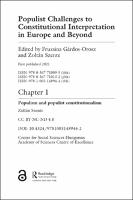Chapter 1 Populism and populist constitutionalism
| dc.contributor.author | Szente, Zoltán | |
| dc.date.accessioned | 2021-08-12T07:58:45Z | |
| dc.date.available | 2021-08-12T07:58:45Z | |
| dc.date.issued | 2021 | |
| dc.identifier.uri | https://library.oapen.org/handle/20.500.12657/50336 | |
| dc.description.abstract | This book explores the relationship between populism or populist regimes and constitutional interpretation used in those regimes. The volume discusses the question of whether contemporary populist governments and movements have developed, or encouraged new and specific constitutional theories, doctrines and methods of interpretation, or whether their constitutional and other high courts continue to use the old, traditional interpretative tools in constitutional adjudication. Divided into four parts, Part I contains three chapters elaborating the theoretical basis for the discussion. Part II examines the topic from a comparative perspective, representing those European countries where populism is most prevalent, including: Austria, Croatia, the Czech Republic, Greece, Hungary, Italy, Poland, Romania, Spain, and the United Kingdom. Part III extends the focus to the United States, reflecting how American jurisprudence and academia have produced the most important contributions to the theory of constitutional interpretation, and recent political developments in that country might challenge the traditional understanding of judicial review. This section also includes a general overview on Latin America, where there are also some populist governments and strong populist movements. Finally, the editors’ closing study analyzes the outcomes of the comparative research, summarizing the conclusions of the book. | en_US |
| dc.language | English | en_US |
| dc.subject.classification | thema EDItEUR::L Law::LA Jurisprudence and general issues | en_US |
| dc.subject.classification | thema EDItEUR::L Law::LN Laws of specific jurisdictions and specific areas of law::LND Constitutional and administrative law: general | en_US |
| dc.subject.classification | thema EDItEUR::L Law::LA Jurisprudence and general issues::LAM Comparative law | en_US |
| dc.subject.classification | thema EDItEUR::L Law::LN Laws of specific jurisdictions and specific areas of law::LNA Legal systems: general::LNAA Legal systems: courts and procedures | en_US |
| dc.subject.classification | thema EDItEUR::L Law::LN Laws of specific jurisdictions and specific areas of law::LND Constitutional and administrative law: general::LNDH Government powers | en_US |
| dc.subject.classification | thema EDItEUR::L Law::LN Laws of specific jurisdictions and specific areas of law | en_US |
| dc.subject.classification | thema EDItEUR::J Society and Social Sciences::JP Politics and government::JPH Political structure and processes::JPHC Constitution: government and the state | en_US |
| dc.subject.other | Law, Constitutional Law, Constitutional Interpretation, Populism, Populist constitutionalism, Courts, Constitutional Theory | en_US |
| dc.title | Chapter 1 Populism and populist constitutionalism | en_US |
| dc.type | chapter | |
| oapen.identifier.doi | 10.4324/9781003148944-2 | en_US |
| oapen.relation.isPublishedBy | 7b3c7b10-5b1e-40b3-860e-c6dd5197f0bb | en_US |
| oapen.relation.isPartOfBook | 883f4535-fbf0-4ec8-b429-652b86d1f749 | en_US |
| oapen.relation.isbn | 9780367710095 | en_US |
| oapen.relation.isbn | 9780367710132 | en_US |
| oapen.imprint | Routledge | en_US |
| oapen.pages | 27 | en_US |
| oapen.remark.public | Funder name: Centre for Social Sciences Hungarian Academy of Sciences Centre of Excellence | |
| peerreview.anonymity | Single-anonymised | |
| peerreview.id | bc80075c-96cc-4740-a9f3-a234bc2598f1 | |
| peerreview.open.review | No | |
| peerreview.publish.responsibility | Publisher | |
| peerreview.review.stage | Pre-publication | |
| peerreview.review.type | Proposal | |
| peerreview.reviewer.type | Internal editor | |
| peerreview.reviewer.type | External peer reviewer | |
| peerreview.title | Proposal review | |
| oapen.review.comments | Taylor & Francis open access titles are reviewed as a minimum at proposal stage by at least two external peer reviewers and an internal editor (additional reviews may be sought and additional content reviewed as required). |

